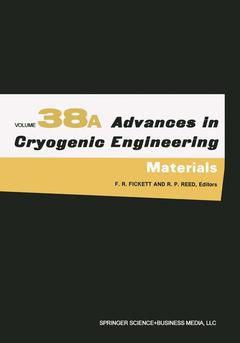Description
Materials, Softcover reprint of the original 1st ed. 1992
Advances in Cryogenic Engineering Series, Vol. 38
Coordinators: Fickett F.R., Reed Richard P.
Language: English
Publication date: 04-2013
457 p. · 17.8x25.4 cm · Paperback
457 p. · 17.8x25.4 cm · Paperback
Description
/li>Contents
/li>
The ninth International Cryogenic Materials Conference (ICMC) was held on the campus of the University of Alabama at Huntsville (UAH) in collaboration with the Cryogenic Engineering Conference (CEC) on June 11-14, 1991. The continuing bond between these two major conferences in the field of cryogenics is indicative of the extreme interdependence of their subject matter. The major purpose of the conference is sharing of the latest advances in low temperature materials science and technology. However, the many side benefits which accrue when this many experts gather, such as identification of new research areas, formation of new collaborations which often cross the boundaries of both scientific discipline and politics, and a chance for those new to the field to meet the old-timers, may override the stated purpose. This 1991 ICMC was chaired by F. R. Fickett of the National Institute of Standards and Technology. K. T. Hartwig, of Texas A&M served as Program Chairman with the assistance of eleven other Program Committee members. We especially appreciate the contributions of the CEC board and its Conference Chairman, J. Hendricks of Alabama Cryogenic Engineering, to the organization. of this joint conference. UAH hosted the conference. The local arrangements and management, under the watchful eye of Ann Yelle and Mary Beth Magathan of the UAH conference staff, were excellent. Participation in the CEC/ICMC continues to exceed expectations with 650 registrants for the combined conference.
Mechanical Properties of Incoloy 908 — An Update.- The Effect of Indium Additions on the Cryogenic Tensile Properties of Superplastically Deformed Al-Cu-Li-Zr Alloy 2090.- Deformation and Fracture of Al-Li Alloys in Mechanical-Impact Tests.- Microstructure and Cryogenic Tensile Fracture Behavior of an Al-Li-Zn-Zr Alloy.- Microstructural Influence on the Work Hardening of Aluminumlithium Alloy 2090 at Cryogenic Temperatures.- Effects of Nb3Sn Heat Treatment on the Strength and Toughness of 316LN Alloys with Different Carbon Contents.- Metastable Austenites in Cryogenic High Magnetic Field Environments.- Property Evaluation of Ni Base Alloy for Superconducting Generators and Its Application to Seal Welded Joints.- Vamas Second Round Robin Test of Structural Materials at Liquid Helium Temperature.- Effect of Hydrogen Charging on Ambient and Cryogenic Mechanical Properties of a Precipitate-Strengthened Austenitic Steel.- Deformation Measurements of Materials at Low Temperatures Using Laser Speckle Photography Method.- Hydrogen Effect on the Mechanical Properties of Incoloy 907 from Ambient to Cryogenic Temperature.- Thick-Section Weldments in 21-6-9 and 316LN Stainless Steel for Fusion Energy Applications.- Joining of Austenitic Stainless Steels for Cryogenic Applications.- Creep of Indium at Low Temperatures.- 1100 Hour Creep Test Results for Ofhc Copper: Validation of Previously Published Results.- Fatigue and Fatigue Crack Growth Properties of 316LN and Incoloy 908 Below 10 K.- Deformation Structures in High-Cycle Fatigue of 0.1N32Mn-7Cr Steel at Cryogenic Temperatures.- Near-Threshold Fatigue Crack Growth of Austenitic Stainless Steels at Liquid Helium Temperature.- Long-Crack Fatigue Thresholds and Short Crack Simulation at Liquid Helium Temperature.- SuperconductorConduits: Fatigue Crack Growth Rate and Near-Threshold Behavior of Three Alloys.- High-Cycle Fatigue Properties of Titanium Alloys at Cryogenic Temperatures.- Cold Thermal Fatigue of Austenitic Stainless Steel.- Influence of Aging on the Fracture Toughness of Cryogenic Austenitic Materials, Evaluated by a Simple Test Method.- Effects of Boron on Increasing Toughness of High Strength High Manganese Non-Magnetic Steels.- The Charpy Impact Test as an Evaluation of 4 K Fracture Toughness.- Charpy Specimen Tests at 4 K.- Selected Residual Effects Upon Temperature Transitions.- Reactor Neutron and Gamma Irradiation of Various Composite Materials.- Radiation Damage of Glass-Fiber-Reinforced Composite Materials at Low Temperatures.- Effects of Fabric Type, Specimen Size, and Irradiation Atmosphere on the Radiation Resistance of Polymer Composites at 77 K.- A Radiation-Resistant Epdxy Resin System for Toroidal Field and Other Superconducting Coil Fabrication.- Effects of Radiation on Insulation Materials.- Radiation Effects on High Current Diodes at Cryogenic Temperatures in an Accelerator Environment.- Alumina Dispersion-Strengthened Copper Alloy Matrix Ti Added Nb3Sn Wire by the Tube Process.- Electrical Resistivity of Nanocrystalline Ni-P Alloys.- Magnetic Property of Gadolinium Hydrides.- Quench Protection Diodes for the Large Hadron Collider (LHC) at Cern.- Coefficient of Friction Measurements of Solid Film Lubricants at Cryogenic Temperatures.- Magneto-Transport Properties of Filamentary Aluminum Conductors in Magnetic Fields, 12–30 K.- Tribological Behavior of 440C Martensitic Stainless Steel from -184°C TO 750°C.- Scaling Tests on Smooth and Notched Specimens of Polyimide (Sintimid) at Cryogenic Temperatures.- Several Properties of Impregnating Epdxy Resins Used forSuperconducting Coils.- Shear Behavior of Glass-Reinforced Systems at Low Temperatures.- Shear Fracture Tests (Mode II) on Fiber Reinforced Plastics at Room and Cryogenic Temperatures.- Compression and Shear Tests of Vacuum-Impregnated Composites at Cryogenic Temperatures.- Cryogenic Fatigue Testing of Glass Reinforced Epdxy Tubes.- Glass-Film-Glass Hybrid Organic Composites for Forced-Flow Fusion Magnets.- Fracture-Mechanical Characterization of Fiber Reinforced Plastics in the Crack-Opening-Mode (Mode I).- Fracto-Emission from Crystalline and Non-Crystalline Materials at Cryogenic Temperatures.- Friction and Wear of Radiation Resistant Composites, Coatings and Ceramics in Vacuum and Low Temperature Environment.- An Innovative Process for the Impregnation of Magnet Coils and Other Structures.- Large Scale Tests of Composite Support Struts for Superconducting Magnetic Energy Storage Rings.- Friction and Wear of a Three-Dimensional Fabric-Reinforced Plastic at Room Temperature and Liquid Nitrogen Temperature.- Modification of the Astm D 3039 Tensile Specimen for Cryogenic Applications.- Thermal Insulating Support Systems for Radiation Environments.- Fatigue Behavior of UD-Carbon-Fibre Composites Cryogenic Temperatures.
© 2024 LAVOISIER S.A.S.
These books may interest you

Advances in Cryogenic Engineering 316.49 €




